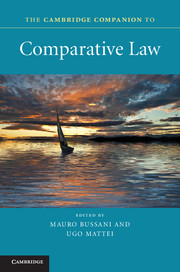Book contents
- Frontmatter
- Contents
- Contributors
- Abbreviations
- Preface
- Part I Knowing comparative law
- Part II Comparative law fields
- 6 Comparative studies in private law
- 7 Comparative administrative law
- 8 Comparative constitutional law
- 9 Comparative criminal justice
- 10 Comparative civil justice
- 11 Comparative law and international organizations
- Part III Comparative law in the flux of civilizations
- Index
- References
8 - Comparative constitutional law
Published online by Cambridge University Press: 05 May 2013
- Frontmatter
- Contents
- Contributors
- Abbreviations
- Preface
- Part I Knowing comparative law
- Part II Comparative law fields
- 6 Comparative studies in private law
- 7 Comparative administrative law
- 8 Comparative constitutional law
- 9 Comparative criminal justice
- 10 Comparative civil justice
- 11 Comparative law and international organizations
- Part III Comparative law in the flux of civilizations
- Index
- References
Summary
Constitution as law, instrument, and culture
‘Constitution’ – like ‘nation’, ‘state’, ‘democracy’, and ‘sovereignty’ – appears as one of the central icons and also one of the most ambiguous ideological structures in the pool of cultural representations of modernity. Constitutions react to the individual and societal need for orientation by offering a language of rights and values and to the requirement of authoritative decisions by allocating and balancing power within an institutional arrangement. Hence constitutions are not cages of norms, but texts situated in contested fields of ideas and interests and run through by competing interpretations.
In general, comparative constitutional scholarship, rather than expressly addressing the question ‘what is a constitution?’, pragmatically settles on a couple of meanings – or less. Dominant is the notion of the constitution as a higher or supreme law. Superiority is ascertained, technically, by the systematic ranking of constitutional norms at the top of the legal hierarchy, above the ordinary laws, and by the methodological rule that laws have to be interpreted in conformity with the constitution. Genetically, a constitution qualifies as law when it is produced by a law-making body, such as a constitutional assembly or convention, and then is adopted according to legally prescribed procedures (referendum or qualified parliamentary decision). What looks like a routine under the rule of law implies a paradoxical creatio ex nihilo: a people constitutes itself in performing the act of adopting a constitution and has always already been presupposed as empowered to sign the said constitution. This self-empowerment of ‘we the people’, or ‘we the nation’, belies the mystical basis of constitutional authority.
- Type
- Chapter
- Information
- The Cambridge Companion to Comparative Law , pp. 171 - 190Publisher: Cambridge University PressPrint publication year: 2012
References
- 8
- Cited by



